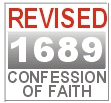 |
"We, the members of the
THE SOVEREIGN
GRACE BIBLE
CHURCH OF
CEBU, INC.,
a non-profit organization, do ordain and establish the following
articles, to which we voluntarily submit ourselves."
|
 |
|
ARTICLE 3: LEADERSHIP
|  |
SECTION 1.
THE GENERAL CONCEPT OF CHURCH OFFICERS
Jesus Christ alone is Head of the church (Col. 1:18), and he governs his church
through officers whom He appoints (Acts 20:28;Eph 4:11) and who are endowed by His Spirit with
graces and gifts needed to accomplish their work (lCor. 15:9,10). Because Christ appoints church
officers, they both have authority (2Cor.13:10) and their authority is limited by him in the
Scriptures (1Cor.14:36-38; 3Jn:9). There are two kinds of church officers, elders and deacons
(Phil.1:1; 1Tim.3:1-13). Elders are called "overseers" because they are charged with the
oversight of the assembly (Acts 20:28; 1Pet. 5:2), "pastors" because they shepherd the flock
of God (Acts 20:28), and "rulers" or "leaders" because they govern and care for the house of
God (1Tim.3:4;Heb.13:17,24).
It is the duty of the church to seek and discover among its members those to
whom Christ the Lord has imparted the necessary graces and gifts for office-bearing (Acts 6:3),
and after formally recognizing them by common suffrage (Acts 6:5,6), to set them apart by united
prayer (Acts 6:6), and then to submit to their authority (Lk.10:16; Jn. 13:20; Heb.13:17;
1 Pet. 5:5). Church officers are not exempt from church discipline, but to the contrary, their
office obliges them to a more rigorous standard of conduct than other members (James 3:1).
SECTION 2.
ELDERS
Paragraph A. The Authority of the Elders.
The Ground of their Authority. The Head of the church (Col.1:18), through
his apostles(Eph.2:20; 1Jn. 4:6), has given to his church the Scriptures as an infallible and
unchanging rule of practice (Mt.20:28; 1Cor.7:17; Col.4:16;2Thes.2:15;3:14; 1Tim.3:14-15), unto
which all church officers are always bound (1 Cor.14:36-38). Where the Scriptures give
explicit or implicit direction to the church on a topic, this direction is never to be
contravened. When no regulative word from Christ is given, church officers are subject to the
general principles of Scripture and to the light and order displayed in creation
(1Cor.11:13-14;14:40). The Limits of their Authority
2a. The word of God defines the limits and boundaries of the authority of church
officers and of the congregation.
2b. The eldership as a body is authorized and responsible to give comprehensive
oversight to the church (Acts 20:17:35; 1Pet. 5:1,2), including the preaching and teaching of
the whole counsel of God (Acts 20:20,21,27; Tit. 1:9); the watching out for the welfare of the
soul of every member of the church (Eph. 4:11- 16;Col. 1:28; 1Thes. 2:11; Heb.13:17) ; and the
directing of the church in all its tasks by setting general policy and by making specific
decisions (1Tim.3:4,5; Heb. 13:17; 1Pet. 5:1,2). Nonetheless, the elders must exercise this
authority with sensitivity to the consensus of the congregation (Ezek. 34:4; 1Tim. 3:4,5;
1Pet 3:7) in the posture of servants and examples to the congregation (Mt.20:25-28; 1Pet.5:3).
Therefore, the elders should seek the advice and support of the congregation respecting any
major endeavor or large expenditure and should be willing to yield to the congregation when
appropriate (Acts 19:30;21:11-14).
2c. Furthermore, the Lord has ordained that congregational approval or suffrage is
mandatory in two important matters, namely, the recognition and confirmation of church officers
(Acts 6:1ff;14:21-23) and the exercise of the most serious acts of church discipline, namely,
suspension and excommunication (1Cor.5:4,5;2Thes.3:14). Congregational approval is defined for
recognition and confirmation of officers in this article, Section 4, Paragraph B (2) and for
the church discipline in Article lV, Section 5, Paragraph C and D.
2d. In addition, congregational approval is necessary for any change of this constitution, for
the possible future revision of our Confession, and for entering or leaving church associations.
Congregational approval is defined for constitutional revision in Article 1, Paragraph E(4),
for possible future revision of our Confession in Article 1, Paragraph D (3).
2e. Finally, congregational advice and consent is necessary for the reception and exclusion of
members. The process for obtaining congregational advice and consent is defined for the
reception of members in Article 11, Section 4, Paragraph C and D, and for exclusion from
membership in Article 11, Section 8, Paragraph A, and in Article 1V, Section 5.
Paragraph B. Plurality of Elders.
The Scriptures clearly teach that there should be a plurality of elders
in each local church (Acts 14:23; 20:17; Phil. 1:1; Tit. 1:5). Therefore, the church should
endeavor to discover and then to formally recognize all the men whom the Holy Spirit has
endowed with the requisite graces and gifts, but only such men. If, in the providence of God, Sovereign Grace Bible Church were to have
only one man holding the office of elder, the church should wait upon God with fervent prayer
that He might remedy this abnormality (Mt. 9:37,38). In such cases, the sole elder should seek
spiritual oversight for himself and his family from the eldership of another church. He should
seek counsel for matters of importance and guard against being self-willed or tyrannical in his
attitude or rule (Eph. 5:21; 1Pet. 5:3,5). The sole elder bears full authority in and
responsibility for the affairs of the church.
Paragraph C. Parity and Diversity of Elders.
The elders are all equal in office and authority (Acts 20:28; Heb. 13:17), but have
diverse gifts and functions. Each elder must be "apt to teach" and be engaged in private
instruction and admonition and in the administration and government of the church
( Acts 20:28; 1Tim. 5:17). However, some will be more experienced, involved, and proficient
than others in executing various dimensions of the pastoral office, and in view of the
God-given diversity of gift, some should be more engaged in formal and public preaching and
teaching than others (1Tim. 5:17). In view of this diversity of gifts as well as the numerous
and grave responsibilities of the office, it is highly desirable that at least one elder
should devote himself full-time to the work of the ministry and the oversight of the church as
his calling in life. The church is responsible to give adequate financial support to elders who
labor in the Word, while others of the elders fulfill the office as they maintain an ordinary
vocation ( Acts 18:3-5; 1Cor. 9:9-11; 1Tim. 5:17,18).
Paragraph D. Number of Elders and Length of Term.
Since the church should endeavor to recognize all the men, and only the men,
whom the Holy Spirit has endowed with the requisite graces and gifts, the number of the elders
shall not be fixed. And since the elders may continue in office as long as they remain
qualified, able, and willing to serve; therefore, the length of their term of office shall
not be fixed by the church.
Paragraph E. Qualifications of Elders.
The general qualifications for a man chosen to fill the office of elder are
clearly set forth in Scripture, particularly in 1Tim. 3:1-7 and Titus 1:5-9. Any man called to
this office must be able conscientiously to affirm his agreement with our Confession of
Faith and the Constitution of the church. Should he at any time move from this position,
he is under spiritual and moral obligation to make this fact known to the church.
Next

|
 |
 |
disable pop-ads



|  |


